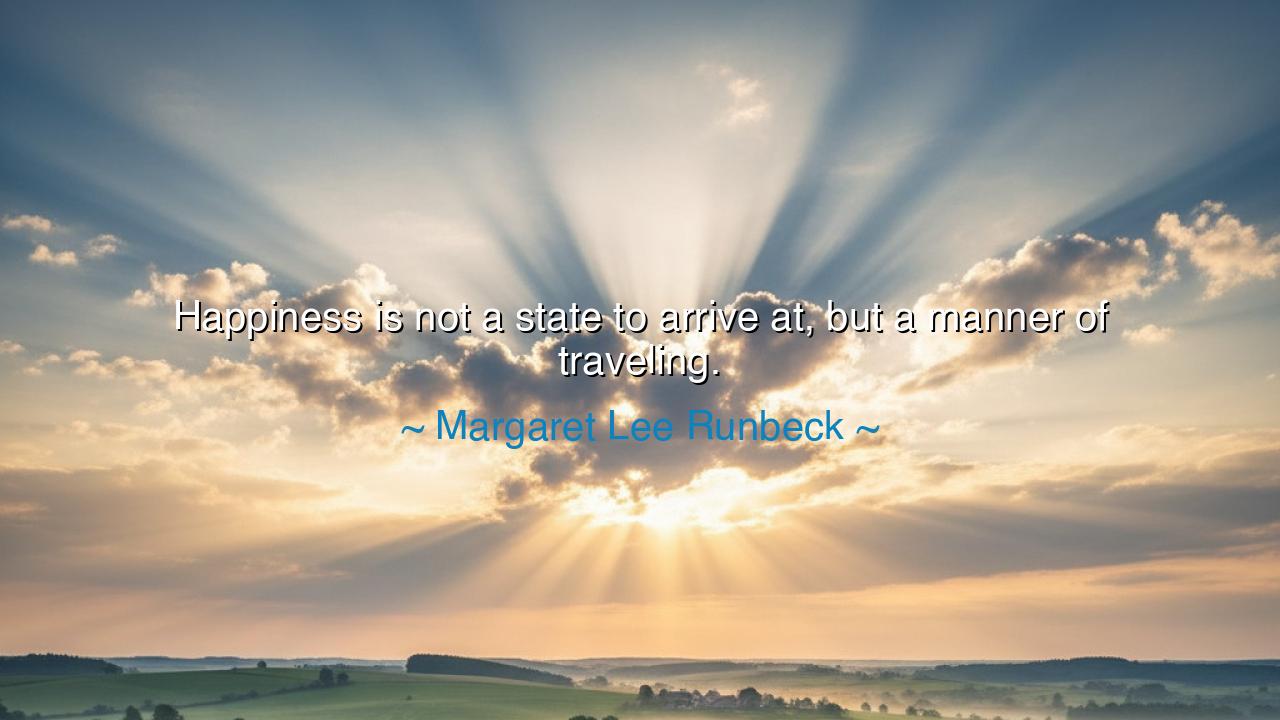
Happiness is not a state to arrive at, but a manner of traveling.






The writer Margaret Lee Runbeck, with the quiet wisdom of one who has watched life unfold through both joy and sorrow, once wrote: “Happiness is not a state to arrive at, but a manner of traveling.” In this single sentence, she revealed what philosophers, poets, and seekers have pursued for centuries—that happiness is not a distant destination waiting beyond toil and struggle, but the way in which we walk through the world. She teaches that joy is not found at the journey’s end, but in the spirit with which we take each step. To those who chase after happiness as though it were a crown to be won, her words stand as a gentle rebuke and a timeless guide: happiness is not achieved, it is lived.
In an age when many believed success and comfort to be the gates through which joy must pass, Runbeck’s insight was revolutionary. Her own life, filled with the challenges of writing, family, and war-torn decades, taught her that contentment does not await us in some far-off land of perfect circumstances. Rather, it blooms in the attitude of the heart, in the grace with which we meet the moments of our days. The origin of her quote lies in this truth born of observation—that happiness is not a reward, but a practice, not an achievement, but a way of being.
This idea, though modern in phrasing, is ancient in spirit. The Stoic philosophers of old spoke much the same. Epictetus said, “We cannot choose our circumstances, but we can always choose how we meet them.” Likewise, the Buddha taught that peace does not come from possessing all that one desires, but from walking the path of awareness and gratitude. Runbeck’s words echo these eternal truths: that joy belongs not to those who reach the summit, but to those who find wonder in the climb. The manner of traveling—the patience, the gratitude, the courage with which one meets each step—is the very essence of a fulfilled life.
Think of Mother Teresa, who walked the streets of Calcutta, surrounded by suffering and death, yet carried within her an unshakeable peace. The world saw misery; she saw faces of God. Her happiness did not come from ease, comfort, or success—it came from the spirit of her journey, the love with which she walked each day’s path. Though she labored in poverty, her heart was rich. Her joy was not a destination reached at life’s end, but a manner of living, moment by moment, step by step. This is the living image of Runbeck’s teaching: that the soul at peace is not the one that has arrived, but the one that travels with grace.
Many people waste their years chasing the mirage of happiness—believing it lies just beyond the next achievement, the next love, the next possession. But such happiness always escapes them, for they seek it outside rather than within. Runbeck’s wisdom reminds us that happiness cannot be pursued as a goal, for it is not something to gain, but a way of seeing. The weary traveler who curses the rain will walk in misery, but the one who smiles at the storm finds beauty even in the thunder. The difference is not in the road, but in the traveler’s heart.
To live by this teaching is to learn the art of presence. Each day becomes a pilgrimage, not to arrive somewhere new, but to walk rightly where we are. The practice is simple, though not easy: awaken each morning and choose gratitude; speak with kindness; labor with purpose; forgive quickly; and pause often to behold the small miracles that line the path. When we travel thus, happiness ceases to be a fleeting emotion and becomes a steady flame that no wind can extinguish.
Therefore, let the lesson be this: do not wait to be happy—walk happily. Do not seek a life free of struggle, but a heart that sings amid the struggle. Let every step, whether heavy or light, be taken with awareness and grace. For in the end, the journey is all there is, and the way we travel becomes the measure of our soul. As Runbeck teaches, happiness is not a place we reach at last, but the rhythm with which we move through life—a music played not by fate, but by the spirit that dances within us.






AAdministratorAdministrator
Welcome, honored guests. Please leave a comment, we will respond soon